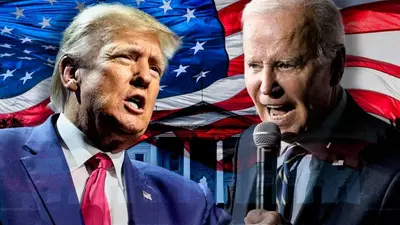Trump accuses Joe Biden of being a “Manchurian Candidate”, during the first US presidential debate. This accusation is rooted in several layers of political rhetoric, historical references, and contemporary geopolitical concerns. Actually he is invoking a loaded term that suggests Biden is a puppet controlled by a foreign power, namely China. To unpack the logic behind this claim, it is essential to explore the historical context of the term “Manchurian Candidate,” analyze Trump’s political strategy, examine the allegations of Biden’s connections to China, and consider the broader implications of such an accusation.
The term “Manchurian Candidate” originates from Richard Condon’s 1959 novel and its subsequent 1962 film adaptation, which tells the story of an American soldier brainwashed by communists to become an unwitting assassin for their cause. The phrase has since entered popular culture as shorthand for someone who is secretly manipulated by a hostile power. This Cold War-era concept reflects deep-seated fears of subversion and betrayal within the American psyche.
Trump’s use of the “Manchurian Candidate” accusation against Biden can be viewed through the lens of his broader political strategy. Throughout his political career, Trump has demonstrated a keen ability to craft and leverage evocative narratives that resonate with his base. By labeling Biden as a “Manchurian Candidate,” Trump taps into fears of foreign influence and corruption, a theme that has been central to his rhetoric. This accusation is not just about Biden personally but is also intended to cast doubt on the legitimacy and patriotism of his entire administration.
The crux of Trump’s accusation lies in the various allegations and suspicions regarding Biden’s and his family’s business dealings with China. These allegations have been a focal point of conservative media and political discourse. Key points often cited include:
- Hunter Biden’s Business Dealings: Hunter Biden, Joe Biden’s son, has been involved in several business ventures with Chinese entities. Critics argue that these dealings represent a conflict of interest and suggest that Joe Biden might be compromised. For example, Hunter Biden’s association with the Chinese private equity firm BHR Partners has been scrutinized for potential ethical concerns.
- Policy Positions: Critics argue that certain policy positions taken by Biden could be seen as favorable to China. For instance, Trump’s supporters often highlight Biden’s perceived softness on China regarding trade policies and human rights issues. They argue that Biden’s approach to China is less confrontational than Trump’s, which they claim could undermine American interests.
- Campaign Contributions and Influence: There are allegations, albeit not substantiated with concrete evidence, that suggest Biden’s campaign and political decisions could be influenced by financial contributions from individuals or entities with ties to China. This narrative feeds into broader conspiracy theories about foreign interference in U.S. elections.
Labeling Biden as a “Manchurian Candidate” has significant implications beyond immediate political gains for Trump. It serves to polarize the electorate further and deepen mistrust in political institutions. By framing Biden as a puppet of China, Trump not only delegitimizes Biden’s presidency but also stokes fears about national security and sovereignty.
Moreover, this accusation contributes to the broader geopolitical tension between the U.S. and China. It frames the U.S.-China relationship in stark, adversarial terms and underscores the perception of an existential threat posed by China. This can influence public opinion and policy decisions, potentially leading to a more confrontational stance in international relations.
However, it is crucial to critically assess the validity and motivations behind Trump’s accusation. Critics argue that the “Manchurian Candidate” label is a baseless and sensationalist claim designed to distract from Trump’s own controversies and shortcomings. They point out that allegations against Biden often lack concrete evidence and rely heavily on guilt by association.
Furthermore, Biden’s policy record does not unequivocally support the notion that he is excessively pro-China. While he may advocate for a different approach than Trump, this does not necessarily equate to being controlled by Chinese interests. Biden has also taken steps to address concerns about China’s human rights abuses and economic practices, indicating a nuanced and multifaceted strategy rather than outright capitulation.
In conclusion, Trump’s accusation that Biden is a “Manchurian Candidate” is a potent piece of political rhetoric that draws on historical fears and contemporary anxieties about foreign influence. While there are substantial logical threads in terms of allegations and geopolitical considerations, the claim is deeply contentious and reflects the highly polarized nature of American politics. It is a narrative that serves to delegitimize Biden’s presidency and frame U.S.-China relations in adversarial terms, but it also demands critical scrutiny and evidence-based assessment to separate political hyperbole from reality.
4o





Leave a Reply